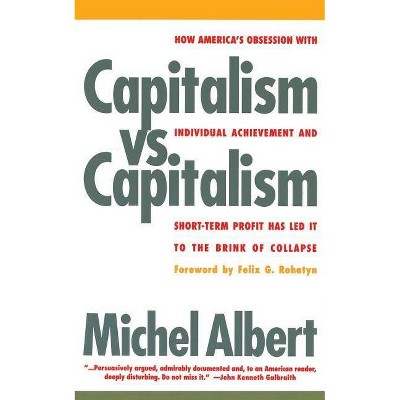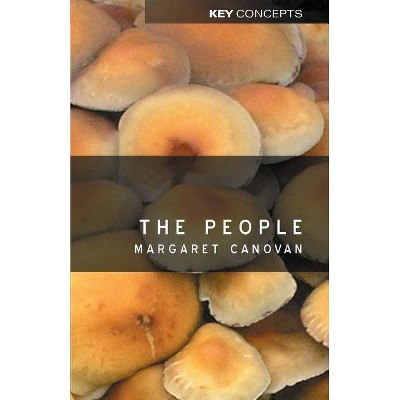Capitalism - (Key Concepts) by Geoffrey Ingham (Paperback)

Similar Products
Products of same category from the store
AllProduct info
<p/><br></br><p><b> About the Book </b></p></br></br>This book provides a basic introduction to the 'nuts and bolts' of capitalism for the beginner. <em>Capitalism</em> is a concise, masterly and up-to-date account of the world's most powerful economic system that is accessible to students and general readers.<p/><br></br><p><b> Book Synopsis </b></p></br></br><b>Now with a substantial new postscript on the financial crisis</b><br /> <br /> <p>This book provides a basic introduction to the 'nuts and bolts' of capitalism. It starts by examining the classic accounts of capitalism found in the works of Adam Smith, Karl Marx, Max Weber, Joseph Schumpeter, and John Maynard Keynes. Each placed emphasis on different institutional elements of capitalism - Smith on the market's 'invisible hand'; Marx on capital's exploitation of labour; Weber on the foundations of economic rationality; and Schumpeter and Keynes on the instability that results from capitalism's essentially monetary and financial character.</p> <p>Drawing on these classic accounts, Ingham then offers a succinct analysis of capitalism's basic institutions and their interconnections. Market exchange, the monetary system, the enterprise, capital and financial markets, and the role of the state are dealt with in separate chapters which make use of contemporary material on the recent history of the capitalist system - including the great inflation of the 1970s and the neo-liberal backlash; the 'dot.com' bubble of the late 1990s; and the collapse of Enron and other US corporations. This revised version includes a substantial new postscript on the financial crisis of 2007-8 and its aftermath. The result is a concise, masterly and up-to-date account of the world's most powerful economic system, written in a way that is accessible to students and general readers alike.</p><p/><br></br><p><b> From the Back Cover </b></p></br></br>Global financial markets are in turmoil. In the wake of the US subprime mortgage defaults, some of the largest and oldest financial institutions on Wall Street have found themselves on the verge of collapse, and both the American and British governments have intervened to try to stabilize the financial sector. Why are financial institutions so important for capitalism, and why are so many of these institutions in trouble today?<BR><P>This book provides a basic introduction to the 'nuts and bolts' of capitalism for the beginner. It examines the classic accounts of capitalism found in the works of Adam Smith, Keynes and others and analyses the key institutions of modern capitalism. Ingham shows that monetary and financial institutions have always been central to the development of capitalism, that global financial markets have expanded on a far greater scale than ever before and that, as has been seen in the past, unleashed money-capital possesses immense self-destructive power. A must-read for anyone who wants to understand global capitalism today.<p/><br></br><p><b> Review Quotes </b></p></br></br><br>The most informative interpretation of the current crisis I have yet encountered.<br /><i><b>LSE Politics Blog</b></i> <p>A must-read for both sociologists and economists - indeed for anyone wanting to deepen their understanding of the systemic nature of today's global financial crisis.<br /><i><b>o</b><b>penDemocracy</b></i><br /><br />One of the best introductions to the economics of capitalism I've read in a long time. Well argued, researched and referenced throughout, it is often a sheer pleasure to read.<br /><i><b>Morning Star</b></i></p> <p>A highly accessible and enjoyable introductory text to the all-pervasive economic system in the modern era.<br /><i><b>Political Studies Review</b></i></p> <p>A good introduction to the basic structure of the capitalist model.<br /><i><b>Tribune</b></i></p> <p>An impressively broad, but also theoretically detailed and empirically well-illustrated, exploration of how capitalism works and develops today. By reading Ingham's comprehensive book, our students will surely become more knowledgeable and probably also better sociologists.<br /><i><b>Acta Sociologica</b></i></p> <p>Not just an excellent summary of key themes and literatures on capitalism, but also a highly instructive first approach to the contemporary issue of all issues, the global financial crisis.<br /><b>Wolfgang Streeck, <i>Socio-economic Review</i></b></p> <p>In this meticulous and superbly crafted book Geoff Ingham dissects the nature of capitalism as a complex economic order in which money plays a central role. In developing his rich account he draws upon a remarkable range of theorists and examples which will make the book essential reading to students not only of sociology but throughout the social sciences.<br /> <b>Mike Savage, University of Manchester</b></p> <p>As an economic system, capitalism forms the basis for western society and for sociological understandings of society. Here, Ingham provides a useful summary of the key institutional elements of a capitalist economy, and an insightful discussion of the key theorists of capitalism. Many will appreciate his ability to cover so much material so ably.<br /> <b>Bruce Carruthers, Northwestern University</b></p><br><p/><br></br><p><b> About the Author </b></p></br></br><b>Geoffrey Ingham </b>is Reader in Political Economy and Sociology at the University of Cambridge.
Price History
Price Archive shows prices from various stores, lets you see history and find the cheapest. There is no actual sale on the website. For all support, inquiry and suggestion messagescommunication@pricearchive.us


















